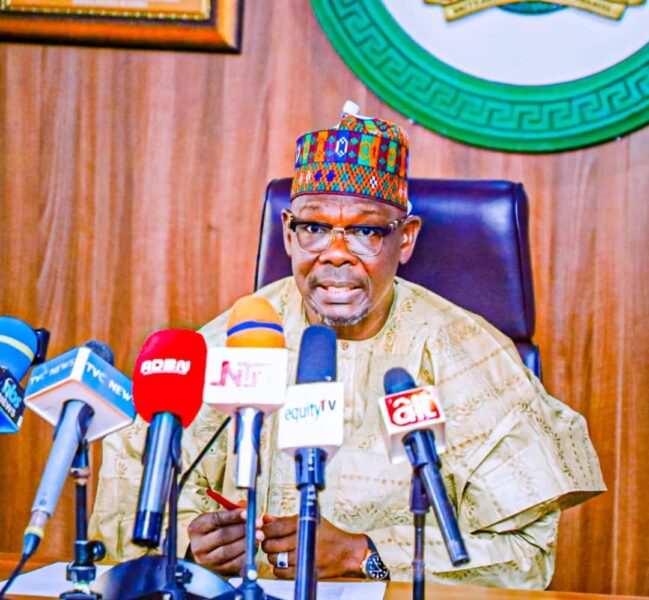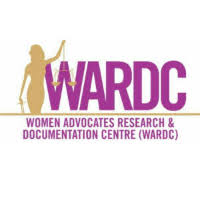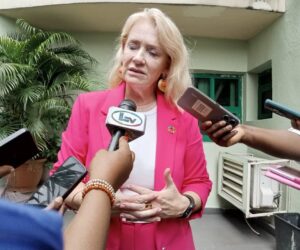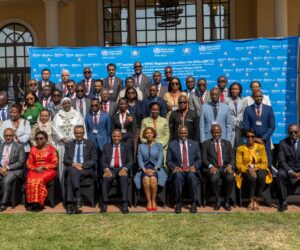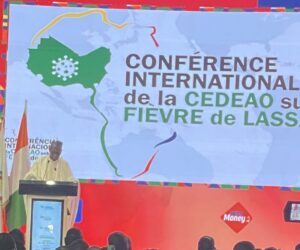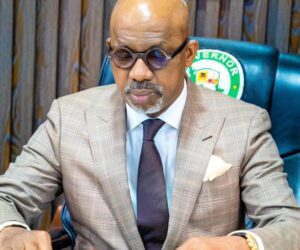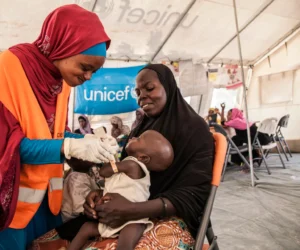…avoid vaccinating children who are seriously ill at the time of the campaign- Expert
From Abel Leonard, Lafia
In a move to safeguard the health of children across Nasarawa State, Governor Abdullahi Sule has officially flagged off the Measles-Rubella (MR) vaccination campaign at Akwanga Local Government Area, marking the beginning of a comprehensive state-wide immunisation effort targeting over 1.37 million children aged 9 months to 14 years.
The launch, held amid heightened awareness of recent measles outbreaks in parts of the state, underscores Nasarawa’s commitment to reducing child mortality and combating vaccine-preventable diseases. With the campaign, the government hopes to eliminate measles and rubella infections from its borders while integrating MR vaccines into the routine immunisation schedule.
The event, attended by top government officials, traditional rulers, health experts, and development partners including UNICEF, AFENET, WHO, Gavi, and C-WINS, marked a new phase in the fight against measles-rubella — diseases known to cause blindness, deafness, brain damage, and even death in unvaccinated children.
Before the launch, Nasarawa State had been battling recurring measles outbreaks, particularly in rural and hard-to-reach communities. Earlier in 2025, an outbreak in Taliga village of Rukubi Ward in Doma Local Government Area left over 40 children infected, according to reports from the State Ministry of Health. Although no deaths were recorded, the incident revealed a worrying gap in immunisation coverage and the persistence of “zero-dose” children — those who have never received any vaccines.
Health officials observed that most of the affected children in Doma had not received a single dose of the measles vaccine, exposing the magnitude of the challenge. The outbreak forced emergency response teams to deploy rapid intervention measures, including mop-up vaccination, disease surveillance, and intensified community mobilisation.
Governor Sule, deeply concerned by the development, directed immediate containment efforts and tasked the State Primary Health Care Development Agency (NAPHDA) to strengthen vaccination campaigns. This urgency eventually culminated in the official launch of the Measles-Rubella campaign in Akwanga.
Flagging off the campaign, Governor Sule called on parents and caregivers to take advantage of the opportunity to protect their children against life-threatening diseases.
“I strongly endorse the Measles-Rubella vaccine being introduced by the Federal and State Governments in partnership with our development partners. Measles and rubella are highly contagious diseases that can cause deafness, blindness, heart defects, brain damage, and even death in children,” Governor Sule stated at the Akwanga flag-off ceremony.
The Governor reaffirmed that his administration is determined to strengthen the state’s healthcare system through increased funding, infrastructure development, and human resource capacity, especially at the grassroots level.
“We are working to ensure that this vaccine is available, accessible, and administered by qualified health workers in all our local government areas. I appeal to every parent and caregiver to ensure that all children between 9 months and 14 years are brought to vaccination centres during this campaign,” he urged.
He also lauded development partners like UNICEF, Gavi, WHO, and AFENET for their consistent support in health interventions, describing their collaboration as “a demonstration of shared commitment to child survival and a healthy Nasarawa.”
The campaign aims to reach 1,372,251 children across Nasarawa’s 13 Local Government Areas — one of the highest coverage targets in North Central Nigeria. It adopts a multi-pronged strategy combining fixed posts, temporary outreach stations, and house-to-house mobilisation, ensuring that even children in remote communities are not left out.
According to Dr. Usman Iskilu, Executive Secretary of the Nasarawa State Primary Health Care Development Agency, the campaign represents a critical step in the fight to eliminate measles and rubella from the state.
“The Measles-Rubella campaign is not just a stand-alone activity. It’s part of an integrated effort that includes routine immunisation strengthening, disease surveillance, and public education. Our target is to ensure that every eligible child receives this vaccine and that no community is left behind,” Dr. Iskilu explained.
He said the campaign is being implemented with technical and financial support from global partners, while the state government provides leadership and logistics support.
Health experts across Nasarawa have hailed the initiative as timely and necessary.
At a media dialogue organised by UNICEF and partners in Lafia ahead of the flag-off, Dr. Abraham Kayode, the AFENET consultant for Nasarawa, emphasised the importance of mass participation to achieve herd immunity.
“The target is 1.3 million children in Nasarawa alone. That’s nearly the entire child population between 9 months and 14 years. Parents should make sure that their children are vaccinated at designated posts during the exercise,” he said.
Dr. Kayode warned against vaccinating children who are seriously ill at the time of the campaign and encouraged caregivers to seek medical advice in such cases. He also stressed that the vaccine is safe, free, and effective, dismissing rumours and misinformation circulating in some communities.
Similarly, Dr. Gaza Gwamna, the State Commissioner for Health, said that the Sule administration is leaving nothing to chance in its pursuit of a disease-free state.
“We are dealing with a disease that spreads fast and can be deadly, especially among unvaccinated children. That is why our approach goes beyond vaccination — it includes communication, training, and community engagement,” he said.
“We are also sensitive to the religious and cultural contexts of our people. We have engaged religious and traditional leaders to mobilise their followers and dispel myths surrounding vaccination,” he added.
In rural communities, where access to healthcare is often limited, the success of such campaigns depends largely on local ownership and trust. Recognising this, the government and its partners have engaged traditional rulers, community heads, and faith-based organisations to drive awareness at the grassroots.
During the campaign flag-off, the Paramount Ruler of Akwanga, HRH The Chu-Mada, Samson Gamu Yare commended Governor Sule’s proactive leadership in prioritising child health. He assured that traditional institutions would continue to support government programmes aimed at improving the wellbeing of citizens.
“Our role as traditional leaders is to protect our people. We will continue to encourage our subjects to take their children for immunisation. Vaccination saves lives and prevents unnecessary suffering,” the royal father stated.
Community mobilisation efforts also involve health educators, women’s groups, and youth associations, who are carrying out door-to-door enlightenment campaigns in villages across the 13 LGAs.
Dr. Luqman Ahmad, from the UNICEF Kaduna Field Office, described Nasarawa as a model state for partner collaboration.
“We are impressed with the level of political commitment in Nasarawa. The governor himself has championed the cause of immunisation and accountability. Our joint focus is to reach every eligible child, especially those who have never received any vaccine before — the zero-dose children,” Dr. Ahmad explained.
He noted that UNICEF and its partners are providing vaccines, cold-chain equipment, logistics, and training for vaccinators to ensure smooth implementation.
The World Health Organisation (WHO) also reaffirmed its support for the state, emphasising disease surveillance and post-campaign evaluation to ensure no area is left unvaccinated.
While the campaign promises much, challenges persist. Data from the State Primary Health Care Development Agency indicate that thousands of children across Nasarawa remain unvaccinated due to factors such as distance to health facilities, insecurity in border areas, and cultural resistance.
In certain rural communities, especially among nomadic populations, vaccine hesitancy is influenced by religious beliefs, misinformation, and misconceptions about infertility. However, continuous community engagement and education are gradually changing perceptions.
According to Mrs. Asabe Ibrahim, a community health worker in Doma LGA, the biggest obstacle is not lack of vaccines but lack of awareness.
“Some mothers still believe vaccines will make their children sick or infertile. Others think the campaign is political. But when we sit with them, explain in their language, and show examples of children who were vaccinated and are healthy, they begin to understand,” she said.
Nasarawa has witnessed repeated outbreaks of measles in recent years, but health officials believe lessons learned from those experiences have strengthened preparedness. The response to the Doma outbreak earlier in 2025 revealed that quick action, rapid diagnosis, and strong surveillance can contain the disease effectively when combined with community cooperation.
Dr. Gwamna explained that the integration of Measles-Rubella vaccines into routine immunisation means future outbreaks can be drastically reduced.
“We no longer want to wait for emergencies before acting. The MR vaccine is now part of the regular immunisation schedule, which means every new child born in Nasarawa will be protected if the parents comply,” he said.
At the Akwanga Primary Health Centre, Mrs. Laraba Alaku, a mother of three, expressed gratitude for the campaign.
“We heard about this vaccine from the health workers and our church. I brought my children because I don’t want them to suffer from diseases I cannot afford to treat. I am happy the governor remembered us here in Akwanga,” she said.
Another resident, Mr. Musa Ahmed, from Wamba LGA, said the campaign has given parents confidence in the health system.
“Before now, some of us didn’t believe these vaccines were real or safe. But now we see the government and partners coming to our towns, explaining everything, and even vaccinating in front of us. That gives us assurance,” he noted.
To ensure transparency and accountability, the state government has set up monitoring teams comprising representatives from the Ministry of Health, State Primary Health Care Development Agency, WHO, UNICEF, and civil society organisations.
Dr. Usman Iskilu said post-campaign data will be analysed to determine coverage rates, identify missed communities, and plan follow-up interventions.
“We are determined to reach every child. After this campaign, we will continue routine immunisation to ensure sustained protection,” he added.
The Measles-Rubella-Polio campaign in Nasarawa is part of Nigeria’s national effort to eliminate vaccine-preventable diseases — measles, rubella, and polio — by 2030. According to the Federal Ministry of Health, over 100 million children are expected to be vaccinated nationwide during this campaign cycle.
Nasarawa’s proactive stance, visible leadership, and community-oriented approach are being recognised as best practices that other states could emulate.
Governor Abdullahi Sule’s flag-off of the Measles-Rubella vaccination campaign in Akwanga stands as a strong message of hope that no child in Nasarawa should die or suffer from a disease that can be prevented.
The campaign’s success will depend on the collective will of government, partners, health workers, traditional leaders, and, most importantly, parents. If all hands remain on deck, Nasarawa could soon join the ranks of states that have broken the chain of measles-rubella transmission.
As Governor Sule aptly put it:
“Together, we can eliminate measles and rubella from Nasarawa State. Our children deserve a future free from preventable diseases. Let us do this for them, and for the generations to come.”
Displaying IMG-20251006-WA0112.jpg.

